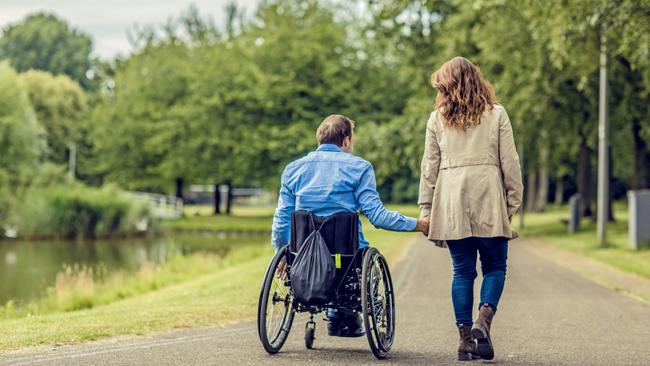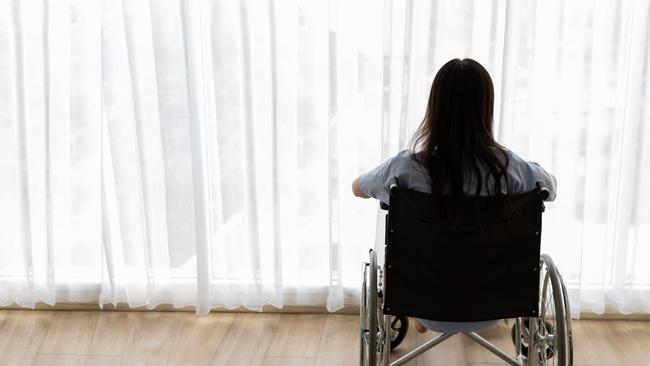My disability is not an outlet for your fixation
When do the lines between being healthily attracted to someone with disability and fetishising their physical condition become blurred?
SA Weekend
Don't miss out on the headlines from SA Weekend. Followed categories will be added to My News.
Bee* sits on her partner’s couch. It’s a standard Saturday. The two hang out and watch television, easing into their weekend. Bee’s attention is drawn away from the television when her phone dings. It’s a message from someone unfamiliar to her. It’s strange, but people contact each other out of the blue over social media constantly.
Bee is an editor who lives with disability and uses a wheelchair part-time. Social media is one way of engaging with people in the publishing industry and for Bee, conversations often lead to work. As quickly as the message appears, it’s gone. Bee searches her “requests” folder on Facebook Messenger, which hides messages from unknown contacts.
The man seems harmless enough and Bee, an outgoing person, replies to the message with a hello. The conversation starts with the small talk of two people connecting for the first time online. The conversation takes a turn, with Bee starting to notice the attention paid to her disability. Bee has always been open about her disability and her social media profile picture shows her sitting in her wheelchair.
“He asks me about my disability, and I explain how I walk on occasions and use my chair on others,” Bee says. These are standard questions for Bee and as far as she is concerned, people don’t know if they don’t ask. “Things started getting uncomfortable when he says, ‘I don’t think you’re unattractive because you are in a wheelchair’ and I remember thinking, ‘well, I don’t think I’m unattractive’.”
Seemingly unperturbed, the man presses. “He said something like ‘I actually think chairs are quite sexy’ and I just replied, ‘well … OK’ and reminded him that I’m in a very happy relationship,” Bee says.

As she recounts this, it’s clear she is still perplexed by these comments. Bee decides to give the man the benefit of the doubt, choosing to let the comments slide, determined to get the conversation back on track.
Despite her efforts to redirect, Bee’s wheelchair continues to feature throughout their exchange.
“The topic turned to what I had done that day,” she says. “As you do, you describe going to work, going shopping, that kind of thing, and he would ask if I used my chair at work and if I used my chair when I went shopping … I kept explaining that it depends on the situation.”
Bee describes her walking style as similar to that of a penguin. Always meant in jest, it’s a great icebreaker when first meeting someone and even better if they are unsure how to talk about her disability.
Bee tells the man this joke, as she explains her disability. The comment catches his attention immediately. “He suggested that if I wore my hair in a ponytail (while walking), it would swing really nicely,” Bee recalls with a wince, “and I remember thinking: ‘How the hell did it get to this point?’”
Bee notices that once he backs off from his advances towards her, the man asks constantly if she knows any single ladies in wheelchairs. Annoyed and disgusted, Bee shuts him down each time the question is asked.
The final straw comes with the man suggesting he could look after Bee, who makes it very clear she’s not someone who needs looking after. At the suggestion she needs looking after, a frustrated Bee tries turning the conversation back on the man, this stranger, desperate to understand why there is such a fixation on her chair and why her disability is attractive to him.
But this is to no avail. Bee shuts down the conversation shortly after and blocks him, the exchange leaving her feeling shaken and objectified.
“It doesn’t become about how my chair assists me … it makes it a defining characteristic. This guy assumed that me using a chair means certain things about me.”
Bee describes the whole interaction as rude, especially after efforts were made on her part to move the conversation on, beyond her disability. Her experience is not uncommon for people living with disability. The man who was fixated on Bee’s disability, particularly her use of a wheelchair, was very likely a “disability devotee” – a person who is sexually attracted to disability or to the idea of having a disability.
In the most extreme cases, people may even take steps to acquire a disability themselves. Devotee communities exist, mainly online, where people with and without disability look for friendships and relationships. An able-bodied person dating someone living with disability does not necessarily make them a devotee. So this raises the question: When do the lines become blurred between being healthily attracted to someone with disability and fetishising their physical condition?
Bee’s experience was extreme. She was fetishised and was left with a negative feeling about the interaction, but there are others living with disability who embrace devotee communities as a way to find connection with those with and without disability.
Sean Dineen identifies as someone living with disability who is sporadically involved in devotee communities. “In my experience, involvement can lead to platonic or romantic relationships,” the university professor says, speaking on Zoom from his Brooklyn apartment.
When it comes to dating and meeting people, Dineen says it is easier for him to connect to those living with disability. “You spend less time explaining yourself and how you feel. Some in the able-bodied community are concerned you are looking for a caregiver rather than a relationship,” he says.
People with disability are constantly forced to explain themselves and the dating scene is no exception. “I’m out in public having a meal and total strangers assume anyone with me is a care person. They ask the most personal questions. I try to be polite and accommodating, but it wears on you after a while.”
Dineen believes dating someone with similar experiences helps people see the funny side in awkward situations that are sometimes created because of misunderstanding and other times because of curiosity. This curiosity exists, too, from devotees when they first reach out.
Dineen admits intrigue and relief when he is not asked about his disability. “I am many other things. I am a professor, an Eagle Scout and I have been blessed to travel the world,” he says with an air of pride, exuding the confidence and self-assurance of a man with a strong sense of identity. “My disability is a small part of who I am (and) nothing to be ashamed of.”
His experience shows mutual and safe relationships are possible for people with and without disabilities within devotee communities.
Dr Marie Tudor is a general practitioner and fellow of the European Committee of Sexual Medicine with qualifications in family therapy. Tudor works with a variety of clients, some of whom live with disability.
She understands why someone with disability may become involved in a devotee community, as it may support people sharing common interests and feeling comfortable in their own skin while pursuing a relationship.
Tudor believes this is possible in a devotee relationship, but warns the person living with disability must assess the relationship regularly.
“It’s important to look for power imbalances or (in extreme cases) signs of abuse, like being taken advantage of,” she says. “People reach out to communities, like devotees, often because they are struggling with isolation and craving connection but have limited opportunities to socialise. It’s an opportunity to search for relationships and get out and about.”
Tudor thinks carefully as she reflects again on relationship dynamics. “It can be done almost out of pity … wanting to be kind, which instead offers a relationship that is not genuinely equal.”

Power imbalances can exist in decision-making, consent and violation of trust. In the worst cases, power imbalance exists as abuse.
As in any relationship, safety is vital, and Dineen feels safe enough to navigate the devotee community. A friendly man in his mid-forties, Dineen craves connection, taking time to get to know those contacting him, but remaining cautious.
“I would be concerned if I felt I was being taken advantage of, but the relationships I’ve had have been pretty positive,” he says. “You constantly have to strike a balance between your adulthood and independence, while still getting the help you need.”
His contrasting experience to Bee’s highlights the importance of personal and online safety. “I make sure no work information shows to anyone other than friends, don’t give personal details like my address and just keep it (conversation) general,” Bee says.
She credits her partner, who also lives with disability, for helping her feel safe and supported throughout her encounter and upon reflection, says there are positives to come out of the experience, including realising that she is comfortable with her identity and her disability.
“I’m not apologising for it,” she says. “I’m not changing and I’m not fitting into whatever (the person is) thinking. I want people to see it as part of me without making a big deal of it.”
It’s important to remember that the majority of relationships between people with and without disabilities boast dynamics which are well balanced and both parties feel safe and supported. In these relationships, disability is only a small part of the relationship rather than a defining characteristic.
Sophie* is currently in a relationship with a person living with disability. She works in the disability sector, met her partner on a dating app in 2020 and was initially apprehensive, unsure whether they would get along.
While her partner was open in his profile about using a wheelchair, there was no detail about what disability he lived with. Sophie was largely unfazed about her partner’s disability and the couple have common interests.
“Our interests aligned. He had a nice smile and liked getting outdoors … he could hold a conversation and wasn’t holding a fish in every photo, which I came to realise was a real bonus on the online dating scene.”
The relationship was well received, with friends, family, and colleagues supportive of Sophie and her partner. She never worried about backlash and the two have happily been together for more than a year.
“I would recommend going out on a date with someone who has similar interests and the same values as you, regardless of if they have a disability or not,” she says. “If they do and you’re not sure how to support them, just be open and ask what you can do and respect the answer they give you. Communication and forward planning about access is important but remember, the person with the disability is the expert in what they need.”
Disability and dating can be a difficult, emotional negotiation. Some navigate this by searching out communities where disability is a central theme; others negotiate disability as an everyday part of life – just another way of doing things, regardless of where disability exists within their relationship. At the end of the day respect, equality and flexibility are just as important in any relationship. ■
* Some names have been changed



